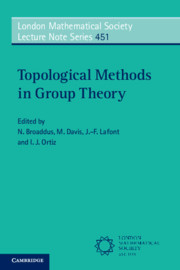Book contents
- Frontmatter
- Contents
- Contributors
- Preface
- 1 Left Relatively Convex Subgroups
- 2 Groups with Context-free Co-word Problem and Embeddings into Thompson’s Group V
- 3 Limit Sets for Modules over Groups Acting on a CAT(0) Space
- 4 Ideal Structure of the C∗-algebra of R. Thompson’s group T
- 5 Local Similarity Groups with Context-free Co-word Problem
- 6 Compacta with Shapes of Finite Complexes: a Direct Approach to the Edwards–Geoghegan–Wall
- 7 The Horofunction Boundary of the Lamplighter Group L2 with the Diestel–Leader metric
- 8 Intrinsic Geometry of a Euclidean Simplex
- 9 Hyperbolic Dimension and Decomposition Complexity
- 10 Some Remarks on the Covering Groups of a Topological Group
- 11 The Σ-invariants of Thompson’s group F via Morse Theory
5 - Local Similarity Groups with Context-free Co-word Problem
Published online by Cambridge University Press: 27 August 2018
- Frontmatter
- Contents
- Contributors
- Preface
- 1 Left Relatively Convex Subgroups
- 2 Groups with Context-free Co-word Problem and Embeddings into Thompson’s Group V
- 3 Limit Sets for Modules over Groups Acting on a CAT(0) Space
- 4 Ideal Structure of the C∗-algebra of R. Thompson’s group T
- 5 Local Similarity Groups with Context-free Co-word Problem
- 6 Compacta with Shapes of Finite Complexes: a Direct Approach to the Edwards–Geoghegan–Wall
- 7 The Horofunction Boundary of the Lamplighter Group L2 with the Diestel–Leader metric
- 8 Intrinsic Geometry of a Euclidean Simplex
- 9 Hyperbolic Dimension and Decomposition Complexity
- 10 Some Remarks on the Covering Groups of a Topological Group
- 11 The Σ-invariants of Thompson’s group F via Morse Theory
Summary
Let G be a group, and let S be a finite subset of G that generates G as a monoid. The co-word problem is the collection of words in the free monoid S∗that represent non-trivial elements of G. A current conjecture, based originally on a conjecture of Lehnert and modified into its current form by Bleak, Matucci, and Neunhöffer, says that Thompson’s group V is a universal group with context-free co-word problem. It is thus conjectured that a group has a context-free co-word problem exactly if it is a finitely generated subgroup of V. Hughes introduced the class FSS of groups that are determined by finite similarity structures. An FSS group acts by local similarities on a compact ultrametric space. Thompson’s group V is a representative example, but there are many others.We show that FSS groups have context-free co-word problem under a minimal additional hypothesis. As a result, we can specify a subfamily of FSS groups that are potential counterexamples to the conjecture.
Information
- Type
- Chapter
- Information
- Topological Methods in Group Theory , pp. 67 - 91Publisher: Cambridge University PressPrint publication year: 2018
